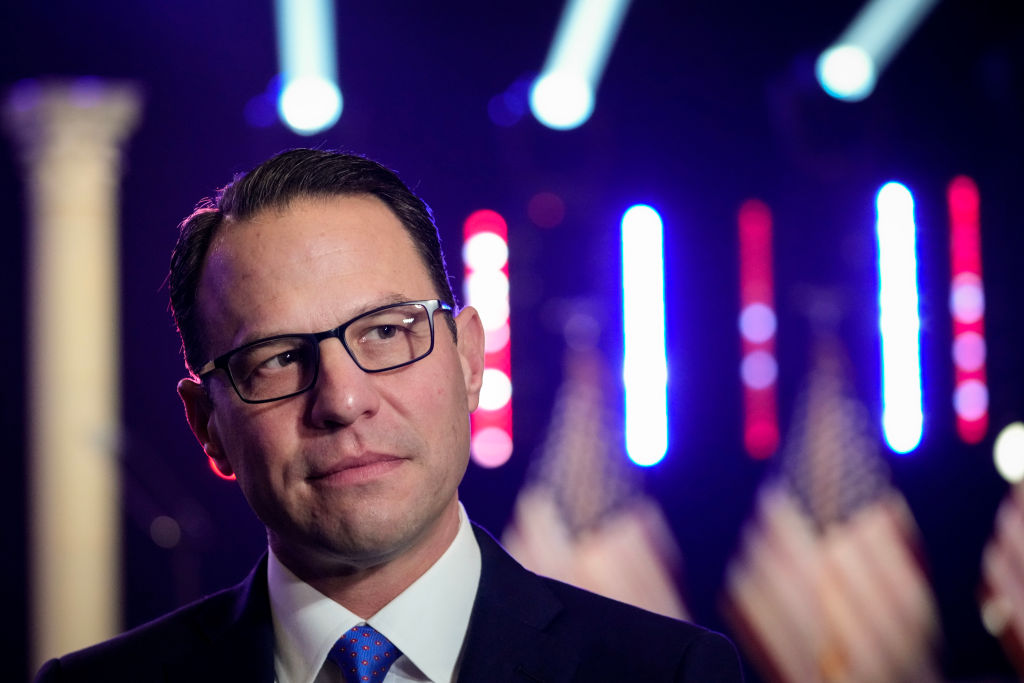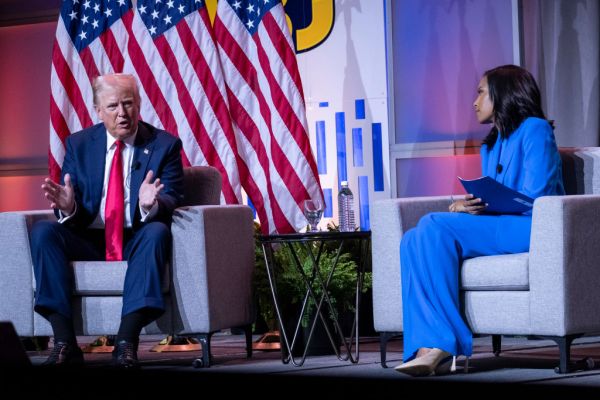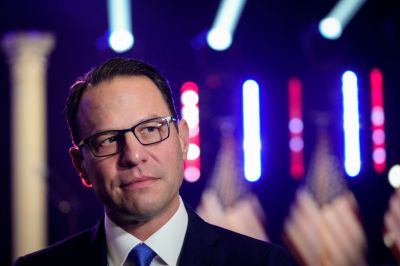Josh Shapiro isn’t talking. Not to me, anyway. His people aren’t talking, either. That’s probably got something to do with his being this close to being this close to being this close to the presidency. He is one selection and one election away from the No. 2 spot in the federal executive org chart.
Democrats have been remarkably open about the one thing possibly holding back the Pennsylvania governor thought to be Kamala Harris’ most likely choice for a running Imate—who seems to have everything going for him, including political talent and a very high approval rating in a state Harris pretty much has to win if she’s to take the White House—and that is: He is Jewish. The New Republic describes him as “the one vice presidential pick who could ruin Democratic unity.” NBC News notes that “Shapiro, an observant Jew, has faced deeper skepticism over Israel than other leading contenders who have espoused similar views.”
For that reason, Shapiro brings to mind a different politician from his neighborhood: Sam Katz.
Katz, a Jewish businessman who was twice the Republican nominee for mayor of Philadelphia (in 1999 and in 2003), was subjected to occasionally outrageous and scandalous antisemitism, some of which I witnessed firsthand as a young newspaper editor in Philadelphia and in neighboring Montgomery County, which is Shapiro’s home turf. Anti-Jewish invective has long been an ordinary part of life in Philadelphia. Some of that stuff in the Katz race was pretty familiar and white-collar, including a fight over the continued service of the head of the city’s minority business outreach panel who complained that “Jewish lawyers” and “Jewish architects” were getting city contracts that should have been awarded to black-owned firms. Some of that stuff was much more old-fashioned, including partisans in crowds screaming “kike!” at Katz and hurling sexual slurs at his wife.
(Do not confuse the antisemitic outbursts directed at mayoral candidate Sam Katz of Philadelphia with the antisemitic bile directed at former mayor Sam Katz of Winnipeg.)
Anti-Jewish political rhetoric in Philadelphia and similar cities tends to come from the left and from one particular corner of African American radicalism, though Katz was harassed by plenty of white people, too, including union goons loyal to corrupt labor boss John Dougherty (“Johnny Doc”), who was at that time chairman of the city’s Democratic Party. Gangs of union guys who just happened to be in the neighborhood would regularly show up to drown out Katz’s speeches and to hurl insults at his wife that are unprintable in this space. How much of the antisemitism in Philadelphia and Philly-style politics is heartfelt Jew-hatred and how much of it is an any-weapon-at-hand approach when confronting a Jewish opponent is not entirely clear. But it is persistent: In the summer of 2023, three of the leading Democratic candidates for mayor in the city were Jewish, but, as Jewish Insider reported:
The candidates themselves, however, have largely refrained from emphasizing their Jewish identities or highlighting communal issues in heavily Jewish Philadelphia, where antisemitic incidents have been on the rise. “I don’t see anyone going around talking about being Jewish,” said Larry Ceisler, a public affairs executive in Philadelphia.
In nearby Lower Merion, a wealthy Montgomery County suburb where I edited local newspapers many years ago, a synagogue was vandalized in March, with a red swastika painted over a sign reading simply, “Our Community Stands with Israel.” The synagogue in question, Temple Beth Hillel, is a prominent institution in the large and diverse local Jewish community. (Fun fact: Jake Tapper had his bar mitzvah there.) “We do not know who did this,” synagogue leaders said in a statement. “We do know that they wanted us to be afraid. A swastika is not a commentary on the policies of the State of Israel, nor is it a sign of solidarity with Palestinians.”
What I found most remarkable about the Katz episode all those years ago was how little attention it received, as though antisemitic tirades were simply an ordinary part of politics. Dom Giordano, a local talk-radio host, noted some of the abuse, but the Philly press had almost nothing to say about it. A column in the Inquirer denounced the union-goon shenanigans but said nothing about the antisemitic slurs, which were not reported.
Progressives, who are normally so exquisitely attuned to bigotry that they manage to detect it where it doesn’t exist, are largely silent on the question of that kind of antisemitism. At the moment, that has more than a little to do with the anti-Israel mood of the campus left, which is enraged that the Jews of Israel exasperatingly mean to go on living and thriving as a Jewish nation. But the indulgence is much older than that, and it doesn’t have to do with a few radical Arab Americans in Dearborn or a few Somali Muslims in Minnesota. Left-wing antisemitism in the United States is in the minor part an Arab-American issue or an issue associated with Muslim immigrants of other backgrounds. It is in the major part an African American issue.
The antisemitism complicating life for Josh Shapiro doesn’t come from the likes of the late Ismail Haniyeh, much less from traditional right-wing antisemites, persistent as those remain—it comes from the likes of celebrities such as Ice Cube and Kanye West, Nation of Islam figures such as Louis Farrakhan (and the ghost of Elijah Muhammad), Black Israelite beliefs, “Hotep”-ism, figures such as Candace Owens, and the like. For years, the black press was full of that kind of stuff, including the wildest conspiracy theories. (And not only antisemitic conspiracy theories: One black newspaper in Philadelphia warned residents to get out of town before the 2004 presidential election because George W. Bush was going to literally nuke black urban neighborhoods.)
The old-style, big-city, political press has declined in influence, and important progressive figures such as the Rev. Al Sharpton have backed away from openly antisemitic tropes, but certain fringes of black social media have taken up the conspiracy-theory torch and the antisemitic cause in much the same way that similar nonsense has been amplified by online white supremacists. Or not even similar nonsense but the same nonsense: One of the great ironies of our time is that many of the antisemitic conspiracy theories that have currency in certain radical black circles—from Holocaust denial to the Rothschilds—are the very same ones championed for decades or more by Jew-hating white racists.
That stuff may seem laughable to many readers. But remember that Kamala Harris hails from San Francisco and came up in Willie Brown’s political world. That sort of thing almost certainly looms larger in her political consciousness than it would if she were a progressive who had grown up in Des Moines.
Kamala Harris is not an antisemite. She is married to a Jewish man, one who earlier this summer presided over the groundbreaking for a memorial to the victims of the Pittsburgh synagogue massacre. Donald Trump’s efforts to smear her as someone who “doesn’t like Jewish people” are unlikely to stick. But that doesn’t necessarily solve Shapiro’s problem—which is whether the left wing of the Democratic party is going to think of him as one Jew too many, as the Jew who broke the camel’s back.
Shapiro’s views on Israel are not particularly radical and are far from right-wing: He is a longtime, trenchant critic of Benjamin Netanyahu and a supporter of a two-state solution. He has gone much further than his fellow Pennsylvania Democrats in cultivating ties with the state’s Arab and Muslim communities. But he also has no time for Hamas apologists, and his administration put out a memo warning state employees that they could be disciplined for “scandalous or disgraceful” conduct, which was taken by many as a shot across the bow of anti-Israel protesters who have at times taken up the antisemitic and eliminationist rhetoric of Hamas et al. Which is to say, Shapiro has utterly normal, mainstream views that would hardly be an issue if not for the fact that he is an observant Jew.
Twenty years ago, I was shocked by how open antisemitism in progressive politics was treated as utterly normal. I suppose it is utterly normal. If Harris selects Shapiro, that will be a sign that such antisemitism is not dispositive—but, then, I don’t think anybody thought it was. On the other hand, the fact that Harris was told—in polite and indirect terms, of course—to think twice before picking the Jew seems to me to attest to a persistent national failure.







Please note that we at The Dispatch hold ourselves, our work, and our commenters to a higher standard than other places on the internet. We welcome comments that foster genuine debate or discussion—including comments critical of us or our work—but responses that include ad hominem attacks on fellow Dispatch members or are intended to stoke fear and anger may be moderated.
With your membership, you only have the ability to comment on The Morning Dispatch articles. Consider upgrading to join the conversation everywhere.